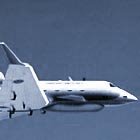Big Sensation in Small Country
 Back home in Sweden there are those trying to create some sensation out of the disclosure that the signals intelligence authority FRA during the Cold War acquired some equipment directly from the United States.
Back home in Sweden there are those trying to create some sensation out of the disclosure that the signals intelligence authority FRA during the Cold War acquired some equipment directly from the United States.Great sensation. Great scandal. Calls for further investigation.
But hardly either news or remarkable.
Although Sweden had a rather competent defence industry during the past decades – including in sensitive electronic areas – we were obviously not manufacturing everything needed ourselves.
We were dependent on access to Western technologies in a number of different areas.
The air force and its extensive fleet of fighters was the most notable case.
After an initial attempt in the 1950’s we gave up trying to develop and manufacture jet engines on our own. And all the fighters designed and manufactured in Sweden since then have had engines from primarily the United States, although often heavily modified and improved.
And the same obviously applied in other areas, including signals intelligence.
It is certainly still the case.
The website of the FRA sigint agency portrays the US-made sigint aircraft that were imported in during the last decade only. We have two of those, and it goes without saying that a very substantial part of everything on them originates in the United States.
Sensation, sensation.
These Gulfstream aircraft replaced older Caravelle’s – French! – that in its turn replaced even older DC3’s – also American!
During the decades of the Cold War Sweden maintained a robust and competent intelligence establishment, with FRA as the perhaps single most important component.
It was essential in order to be able to have a national defence essentially based on mobilisation. We were extremely dependent on reliable information about the possible build-up of military forces in our vicinity so as to be able to react appropriately.
We were living in the shadow of the Soviet Union and its military power.
But knowing the facts about what was happening – or not – beyond its closed curtains also in military terms allowed us to be more relaxed than we might otherwise have been.
And that required a robust intelligence establishment - which in turn was dependent on cooperation with other countries in the West. Technical as well as in the exchange of information. There were things we could do that no one else could - and that gave us access to things we could not reach but had an obvious national interest in.
In terms of its own developed capabilities, it must be said that FRA in certain respect during these decades probably was second to none in the world.
Already during WW2 it cracked the German military code with the help of the famous Enigma machine. That was the achievement in Britain so central to the Allied war effort that it was kept secret for half a century.
But less known is that it was duplicated in Sweden.
And building on that, as well as an important infusion of experience from Finland in the late 1940's, FRA developed into a world-class organisation in its field during the decades that followed.
It's something to be proud of.
That's the essence of the real story.
But the summer debate back home seems smaller than usual.


<< Home